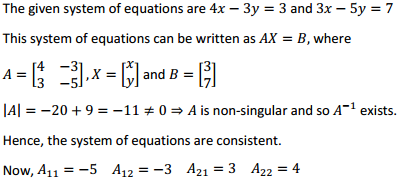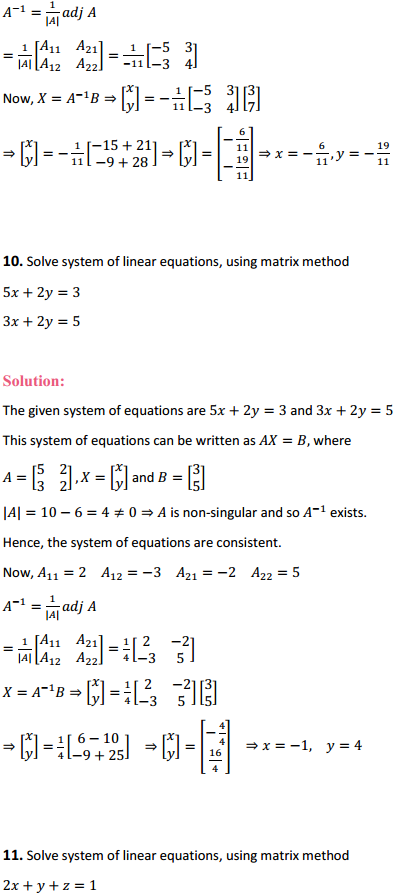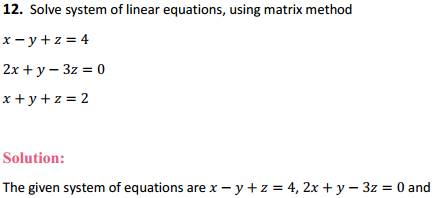Here we are providing Going Places Extra Questions and Answers Important Questions Class 12 English Flamingo, Extra Questions for Class 12 English was designed by subject expert teachers.
Going Places Extra Questions and Answers Important Questions Class 12 English Flamingo
Going Places Extra Questions and Answers Short Answer Type
Going Places Short Question Answer Class 12 Question 1.
Who was Jansie and Sophie? Where were they likely to find work?
Answer:
Jansie and Sophie were two school-going girls. They belonged to low middle class families. After completing their school, they both were earmarked to work in a biscuit factory.
Going Places Question Answers Class 12 Question 2.
Why did Jansie discourage Sophie from having dreams?
Answer:
Jansie and Sophie both belonged to low middle class families. They did not have any means to fulfil their ambitions and dreams. Jansie had calmly accepted her fate. But Sophie was a very ambitious girl. She had very unrealistic dreams and fantasies. Jansie knew that her friend had to meet disappointment in the end. Therefore she discouraged Sophie from having dreams.
Going Places Class 12 Questions And Answers Question 3.
What did Sophie think of doing after her school?
Answer:
Sophie was a highly ambitious girl. First she decided to open a boutique, then she thought of becoming a manager to start with. She also thought of becoming an actress.
Going Places Class 12 Extra Questions And Answers Question 4.
Why did Sophie long for her brother’s affection?
Answer:
Sophie liked her brother more than any other person. But he was very introvert. He would not tell any of his secrets. However he was the only person who listened to Sophie’s wild stories. Therefore, Sophie longed for her brother’s affection.
Going Places Question Answer Question 5.
Why didn’t Sophie want Jansie to know about her meeting with Danny?
Answer:
Sophie thought if Jansie came to know about her meeting with Danny, she would tell everyone. Then thousands of people would come to her house. It would make her father very angry. She thought that her father could then possibly murder her.
Going Places Extra Questions Class 12 Question 6.
Why did Jansie discourage Sophie from entertaining thoughts about the sports-star Danny Casey? .
Answer:
Jansie knew her friend Sophie well. She knew that Sophie’s meeting with Danny Casey was just her imagination. She wanted Sophie to be practical. She a Juiew such thoughts would create troubles for Sophie. Therefore she discouraged Sophie from entertaining thoughts about the sports-star Danny Casey.
Going Places Question Answer Class 12 Question 7.
It is natural for teenagers to have unrealistic dreams. What would you say are benefits and disadvantages of such fantasising?
Answer:
Teenage is considered the best period in person’s life. In this age, the person has maximum energy and he is free from every responsibility. But it is also the age when the person has dreams and fantasies. Every teenager has some role model also. It would be beneficial for the person if he goes into the direction of his/her dreams diligently. But mere fantasising and dreaming bring nothing but disappointment.
Going Places Important Questions Class 12 Question 8.
‘Damn that Geoff, this was a Geoff thing not a Jansie thing.’ Why did Sophie say so?
Answer:
Sophie told her brother, Geoff about her meeting with Danny Casey. She was sure that that he would not tell anybody her secret. But on the other hand, Geoff told that secret to Jansie’s brother and Jansie asked Sophie about it. Sophie became very angry with her brother and said, ‘Damn that Geoff, this was a Geoff thing not a Jansie thing.’
Going Places Questions And Answers Class 12 Question 9.
How did Sophie’s father react when Geoff told him about her meeting with Danny Casey?
Answer:
Sophie’s father turned his head on his thick neck to look at her. His expression was one of disdain. Sophie told him that Danny Casey was going to buy a shop. At this her father muttered, “This is another of your wild stories. One of these days you’re going to talk yourself into a load of trouble.” This shows that the old man knew his daughter very well.
Going Places Class 12 Questions And Answers Pdf Question 10.
What is the profession of Geoff ? How is he different from his sister?
Answer:
Geoff left his school three years ago. Now he works as an apprentice mechanic. He has to travel to his work to the far end of the city. But he is very introvert. He is not a daydreamer like Sophie. But he loves his sister very much so he listens her wild stories patiently.
Question 11.
Who was Danny Casey? How can you say that the members of Sophie’s family were great fan of his?
Answer:
Danny Casey was a young football player. He played for the United. Sophie and the members of her family were a great fan of his. Sophie even started dreaming to have a date with him. Her family went to see a football match in which Danny was playing.
Question 12.
Where did Sophie meet Danny Casey as she claimed?
Answer:
Sophie met Danny for the first time in the arcade. It was she who spoke first. She wanted an autograph for her little brother Derek. But neither of them had any pen. Therefore, they just talked a bit.
Question 13.
Do you think that Sophie’s meeting with Danny actually happened or it was just a part of her imagination?
Answer:
It appeared possible that Danny might have met with Sophie at the arcade. It also appeared possible they might have talked a bit. But it didn’t appear to be I possible that Danny would have called her to meet i the next week. The last part of her story is highly improbable. It was just a part of her imagination.
Question 14.
What thoughts come to Sophie’s mind as she sit by the canal?
Answer:
Sitting by the side of the canal Sophie waits for Danny Casey to come. The time keeps on passing. She starts feeling pangs of doubt inside her. Then she remembers Geoff saying he would never come. She thinks that she will never be able prove that the others were wrong to doubt her.
Question 15.
Did Geoff keep his promise to Sophie? How do you know?
Answer:
No, Geoff didn’t keep his promise to Sophie. He told Jansie’s brother about Soiphie’s meeting with Danny Casey. Jansie asked Sophie about that. Sophie felt a kind of shock. She had never expected that from Geoff.
Question 16.
What kind of a girl Jansie is?
Answer:
Jansie is a very practical girl. She belongs to a low middle class family. But she is contented with her life. She has accepted the reality calmly that she has to work as a petty employee in a biscuit factory.
Question 17.
Write a few lines about Sophie’s father?
Answer:
Sophie’s father belonged to labour class. He belonged to a low middle class. He had rough eating manners. He was quite a carefree person and didn’t take much interest in the activities of his children.
Question 18.
Where was it most likely that the two girls would find work after school?
Answer:
Both the girls belonged to low middle class. They had been earmarked for a biscuit factory.
Question 19.
Why did Sophie wriggle when Geoff told her father that she had met Danny Casey?
Answer:
Sophie knew that her father would become angry when he came to know about her meeting with Danny Casey. She knew he would scold her badly and severely. Therefore, she wriggled when Geoff told her father that she had met Danny Casey.
Question 20.
Does Geoff believe what Sophie says about her meeting with Danny Casey?
Answer:
Geoff doesn’t believe Sophie when the latter tells him about her meeting with Danny Casey. He knows his sister well and knows she lives in the world of dreams.
Question 21.
Does her father believe her story?
Answer:
Her father doesn’t believe in her story. He knows her daughter well. He turns his head to look at her. He looks at her in disdain.
Question 22.
How does Sophie include her brother Geoff in her fantasy of her future?
Answer:
Sophie has complete confidence in her brother. She knows that he won’t let her down and support her in every situation. Therefore she includes Geoff in her fantasies.
Question 23.
Which country did Danny Casey play for?
Answer:
Danny Casey played for Ireland. However, the English wanted him to play for them.
Question 24.
Why didn’t Sophie want Jansie to know about her story with Danny?
Answer:
Sophie didn’t want Jansie to know her story about Danny Casey. She thought that Jansie would tell everyone about it. Then the people would come in large numbers to know about it in detail. Sophie was very afraid of her father. She feared that her father would become’ furious. He could also murder her.
Question 25.
Did Sophie really meet Danny Casey?
Answer:
It is very difficult to say whether Sophie met with Danny Casey. She might have seen him from distance and then she weaved the whole story about her meeting with him in her mind.
Question 26.
Which was the only occasion when she got to see Danny Casey in person?
Answer:
One Saturday, Sophie went with her family to watch a football match. Danny Casey was playing in this match for the United. He also scored a brilliant goal for his team. That was the only occasion when she saw Danny Casey in person.
Question 27.
How would you describe the character and temperament of Sophie’s father?
Answer:
Sophie’s father belonged to labour class. He belonged to a low middle class. He had rough eating manners. He was quite a carefree person and didn’t take much interest in the activities of his children.
Question 28.
Why did Sophie like her brother Geoff more than any other person? From her perspective, what did he symbolise?
Answer:
Sophie liked her brother because she had full faith in him. She thought that he would never let her secrets out. Therefore, she used to share her secrets with her. Sophie’s brother spoke very little. Sophie thought he was a symbol of some exotic and interesting world.
Going Places Extra Questions and Answers Long Answer Type
Question 1.
Sophie lives in a world full of dreams which she does not know she cannot realise. Comment.
Answer:
Sophie belongs to a low middle class family. She has no means to gain name and fame.Therefore, she starts weaving in her mind the unrealistic dreams and fantasies. First of all she thinks that she would open a fine boutique in the city. When her friend Jansie tells her that it would take a lot of money to open a boutique, she says that she would become a manager to begin with. She does not realise that no one would make her a manager straight off.
Then she thinks of becoming an actress. She takes a chance meeting with Danny Casey as a beginning of love-affair with him. She dreams of meeting with him. But this and her other dreams are just a product of her imagination. She does not know how to realise them.
Question 2.
Describe the bond between Geoff and Sophie in spite of differences in their temperament and thinking.
Answer:
Geoff was Sophie’s elder brother. He was an apprentice mechanic and left his school three years ago. Unlike Sophie he was very introvert. Sophie was in fact jealous of his silence. But in spite of all this he loved his sister very much. Sophie would share all her secrets with her. Geoff knew that most of the stories Sophie told him were just a product of her imagination.
But even then he listened to her very patiently. He knew that Sophie’s story of meeting with Danny Casey was not true. But even then he promised her that he would not let her secret out to anybody. However, he warned Sophie that Danny Casey was a famous player. He must have a lot of girlfriends. He knew that Danny Casey would not turn up next week to meet her. He tried to persuade Sophie against her craziness for Danny. In fact Geoff was not only the elder brother of Sophie but also her friend and guide.
Question 3.
How different is Jansie from Sophie?
Or
Jansie is just as old as Sophie but she is very different from her. Bring out the contrast be-tween the two friends, citing relevant instances from the story, “Going Places”.
Answer:
Sophie and Jansie are classmates and friends. But they are poles apart as far as their character and temperament is concerned. Jansie is very down to earth girl. She knows that she belongs to a low middle class. She knows her limitations. She has accepted her fate that she has to work in a biscuit factory as a petty employee after her school education.
On one hand Sophie is an ambitious girl. She too belongs to a low middle class. But she has very unrealistic ambitions and dreams. First of all, she says that she will open a boutique, then she says she will become a manager. She also wants to become an actress. In fact she doesn’t know what she wants to become. She weaves a fantasy around a famous football player. She imagines that he would come and meet her. As a result of her unrealistic dreams and fantasies she has to face disappointment.
Question 4.
Describe the character of Sophie’s father and the role played by him?
Answer:
Sophie’s father belongs to labour class. He goes to his work on his bicycle. He is very careless and care¬free person. He has very rough eating manners. He likes to enjoy himself by going to a pub. He doesn’t care much even about his children. But this doesn’t mean that he knows nothing about the temperament of his children.
When Sophie keeps on saying that she has met Danny Casey, he looks at her disdain and says, “This another of your wild stories? One of these days you are going to talk yourself into a load of trouble.” In the end he proves true when Sophie has to meet disappointment regarding her supposed meeting with Danny Casey.
Question 5.
Write in brief the character-sketch of Geoff.
Answer:
Geoff was Sophie’s elder brother. He was three years out of school. He was an apprentice mechanic and he travelled to his work each day to the far side of the city. He was very introvert and spoke very little. Words had to be prized out of him like stones out of the ground. He was the only one with whom Sophie seemed to be close and she used to share all her secrets with him.
He also loved his sister very much. Sophie was jealous of his silence. She thought perhaps he knew many exotic and interesting people. However Geoff was so introvert that he didn’t make new friends easily. In fact, Geoff was a person who loved solitude.
Question 6.
Attempt a character-sketch of Sophie as a woman who lives in her dreams.
Answer:
Sophie belongs to a low middle class family. She has no means to gain name and fame. Therefore, she starts weaving in her mind the unrealistic dreams and fantasies. First of all, she thinks that she would open a fine boutique in the city. When her friend Jansie tells her that it would take a lot of money to open a boutique, she says that she would become a manager to begin with.
She does not realise that no one would make her a manager straight off. Then she thinks of becoming an actress. She takes a chance meeting with Danny Casey as a beginning of love-affair with them. She dreams of meeting with him. But this and her other dreams are just a product of her imagination. In fact, Sophie is a woman who lives in her dreams. She doesn’t know how to realise her dreams.
Question 7.
Sophie was a dreamer. This lesson, ‘Going Places’ reminds us that mere dreams will not help us to accomplish anything. What qualities, do you think, would help Sophie to realise her dreams?
Answer:
Sophie is shown as a girl who remains in the world of dreams. She always wants to gain name and fame. She wants to open a boutique or she wants to become a manager to begin with. She also wants to be an actress. But Sophie doesn’t have any means to fulfil her dreams.
She belongs to a low middle class family. To realise her dreams she has to work very hard. She has to start from a very humble position and then with constant hard work she can accomplish her dreams. But for that she must have a lot of patience and practical approach. By day-dreaming and unrealistic fantasies she cannot accomplish dreams.
Question 8.
Teachers always advise their students to dream big. Yet, the same teachers in the classroom find fault with Sophie when she dreams. What is wrong with Sophie’s dreams?
Answer:
It is always good to dream big. But the dreams should also be realistic. We can’t achieve great heights suddenly as if someone has turned a magical wand. Sophie belongs to a low middle class family. She has no means to gain name and fame. Therefore, she starts weaving in her mind the unrealistic dreams and fantasies. First of all, she thinks that she would open a fine boutique in the city. When her friend Jansie tells her that it would take a lot of money to open a boutique, she says that she would become a manager to begin with. She does not realise that no one would make her a manager straight off.
Then she thinks of becoming an actress. She takes a chance meeting with Danny Casey as a beginning of love- affair with him. She dreams of meeting with him. But this and her other dreams are just a product of her imagination. She does not know how to realise them. We should dream big but for that we should make constant efforts. Mere dreaming brings disappointment as it happens with Sophie.
Question 9.
Every teenager has a hero/heroine to admire. So many times they become role models for them. What is wrong if Sophie fantasies about Danny Casey and is ambitious in life?
Answer:
It is true that almost every teenager has a hero/heroine to admire. That person may be some film star or sports person. Teenagers try to copy them. For them, they become their role models. There is nothing wrong in this. But sometimes this likeness for their role models becomes obsession with them. Teenagers could think nothing but their role models.
Eventually, they have to face disappointment in the end. Exactly this thing happened with Sophie. She took a chance meeting with Danny Casey as a beginning of love affair with him. She kept on dreaming about him. But this dream was not based on reality. As a result, she had to face disappointment in the end.
Question 10.
What were the options that Sophie was dreaming of? Why does Jansie discourage her from having such dreams?
Answer:
Sophie was a very ambitious girl. She lived in the world of dreams and fantasies. She told Jansie that she would open a boutique after leaving the school. At this, Jansie informed her that it took a lot of money to open a boutique. At this Sophie said she would begin her career as a manager. Jansie informed her no one would appoint her as a manager straight off.
Then Sophie told Jansie that she would become an actress since actress had not to work for the whole day. She said when she had earned enough money then she would open her boutique. Jansie knew that she and Sophie were both ear-marked for a biscuit factory. She wished that Sophie should not say such unrealistic things. Jansie wanted Sophie to be sensible and she wanted to discourage her from such fantasies.
Question 11.
Sophie’s dreams and disappointments are all in her mind. Discuss.
Answer:
Sophie belonged to a low middle class family. She had no means to gain name and fame. Therefore she started weaving in her mind the unrealistic dreams and fantasies. First she thought that she would open a fine boutique in the city. When her friend Jansie told her that it would take a lot of money to open a boutique, she said that she would become a manager to begin with.
She did not realise that no one would make her a manager straight off. Then she thought she would become an actress. She took a chance meeting with Danny Casey as a beginning of love-affair with him. She dreamt of meeting with him. But this and her other dreams were just product of her mind and not based on any reality.
Question 12.
What socio-economic background did Sophie belong to? What are the indicators of her family’s financial status?
Answer:
Sophie belonged to a low middle class family. She was going to leave her school within a few months and was earmarked to work in a biscuit factory as a petty employee. This showed that she was not going to do high studies. She lived in a small house which remained smoky. Her father belonged to labour class and had only a bicycle to go to his work.
He had very rough eating manners. He used to enjoy himself in a pub. Her telder brother had left school about three years ago yet was just an apprentice mechanic. All these were the indicators that showed that Sophie’s family was not a well-to-do family.
Question 13.
Sophie and Jansie were class-mates and Mends. What were the differences between them that show up in the story?
Answer:
Sophie and Jansie were classmates and friends. But they were poles apart as far as their character and temperament is concerned. Jansie was very down to earth girl. She knew that she belonged to a low middle class. She knew her limitations. She had accepted her fate that she had to work in a biscuit factory as a petty employee after her school education.
On the other hand Sophie was an ambitious girl. She too belonged to a low middle class. But she had very unrealistic ambitions and dreams. First she said that she would open a boutique, then she said she would become a manager. She also wanted to become an actress. In fact she didn’t know what she wanted to become. She wove a fantasy around a famous football player. She imagined that he would come and meet her. As a result of her unrealistic dreams and fantasies she had to face disappointment.
Going Places Extra Questions and Answers Extract Based
Read, the following paragraph and answer the questions that follow:
(Para-1)
Sophie watched her back stooped over the sink and wondered at the inconguity of the delicate bow which fastened her apron strings. The delicate-seeming bow and the crooked back. The evening has already blacked in the windows and the small room was steady from the stone and cluttered with the heavy-breathing man in his vest at the table and the dirty washing piled up in the corner. Sophie felt a tightening in her throat. She went to look for her brother Geoff.
Questions :
(a) Whose bow did Sophie watched and what did she feel ?
(b) What was the condition of the small room ?
(c) What did Sophie feel and what did she do then ?
(d) Name the chapter and its writer.
Answers:
(a) Sophie watched the back bow of her own mother stooped over the sink and wondered at the inconguity of the delicate bow.
(b) The small room was steamy from the stove and cluttered with the heavy-breathing man in his vest at the table and the dirty washing piled up in the corner.
(c) Sophie felt a tightening in her throat and she went to look for her brother Geoff.
(d) The chapter’s name is ‘Going Places’ and its writter is ‘A. R. Barton’.
(Para-2)
“It was nothing like that, Geoff It was me spoke first. When I saw who it was, I said, “Excuse me, but aren’t you Danny Casey ?” And he looked sort of surprised. And he said, “Yes, that’s right.” And I knew it must be him because he had the accent, you know, like when they interviewed him on the television. So I asked him for an autograph for little Derek, but neither of us had any paper or a pen. So then we just talked a bit. About the clothes in Royce’s window. He seemed lonely. After all, it’s a long way from the west of Ireland. And then, just as he was going, he said, If I would care to meet him next week he would give me an autograph then. Of course, I said I would.”
Questions :
(a) Who looked sort of surprised and why ?
(b) How did Sophie confirm that he was Danny Casey ?
(c) What did Sophie ask him and what happened then ?
(d) While going, what did Danny Casey ask her ?
Answers :
(a) Danny Casey looked sort of surprised because Sophie asked him about his name (identity).
(b) By hearing his accent and remembering his interview on television, she confirmed that he was Danny Casey.
(c) Sophie asked him for an autograph for little Derek but neither of them had any paper or a pen.
(d) While going, Danny Casey asked her. If she would care to meet him next week he would give her an autograph then.
(Para-3)
After dark she walked by the canal, along a sheltered path lighted only by the glare of the lamps from the wharf across the water, and the unceasing drone of the city was muffled and distant. It was a place she had often played in when she was a child. There was a wooden bench beneath a solitary elm where lovers sometimes came. She sat down to wait. It was the perfect place, she had always thought so, for a meeting of this kind. For those who wished not to be observed. She knew he would approve.
Questions :
(a) After dark, where did she walk along ?
(b) Why that place was suitable for meeting ?
(c) Where and why did she sit ?
(d) Why it was a perfect place ?
Answers :
(a) After dark, she walked by the canal, along a sheltered path lighted only by the glare of the lamps from the wharf across the water.
(b) The unceasing drone of the city was muffled and distant, so that place was suitable for meeting.
(c) There was a wooden bench beneath a solitary elm where . lovers sometimes came, she sat down there to wait.
(d) It was a perfect place because lovers metting there could not be observed by anyone.
(Para-4)
And afterwards you wait there alone in the arcade for a long while, standing where he stood, remembering the soft melodious voice, the shimmer of green eyes. No taller than you. No bolder then you. The prodigy. The innocent genius, the great Danny Casey.
And she saw it all again, last Saturday saw him ghost past the lumbering defenders, heard the fifty thousand catch their breath as he hovored momentarily over the ball, and then the explosion of sound as he struck it crisply into the goal, the sudden thunderous eruption of exultant approbation.
Questions :
(a) What was she remembering about Danny Casey ?
(b) What titles did she use for Danny Casey ?
(c) When and what did she see last Saturday ?
(d) What explosion could be seen at the stadium ?
Answers :
(a) She was remembering about the scene of the arcade where he stood. She remembered the soft melodious voice and the shimmer of green eyes.
(b) She titled Danny Casey “No taller than you’, the prodigy, the innocent genius, the great Danny Casey.
(c) Last Saturday, she saw him ghost past the lumbering defenders, heard the fifty thousand catch their breath as he hovered momentarily over the balk
(d) The explosion of sound, the sudden thunderous eruption of exultant approbation could be seen at the stadium.


























